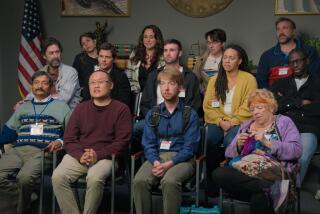Will ’11 Angry Men’ do?
- Share via
In the 1957 movie “12 Angry Men,” Henry Fonda portrayed the lone holdout on a jury charged with deciding whether a young Latino man had stabbed his father to death. Eventually, the Fonda character convinces his fellow jurors that there is reasonable doubt of the young man’s guilt, and the jury acquits him. The film was a fictionalized -- even romanticized -- depiction of one of the hallmarks of the U.S. legal system: that a defendant must be convicted by a unanimous jury of his peers.
To its discredit, the U.S. Supreme Court has allowed Louisiana to chip away at that bedrock by allowing a murder defendant to be convicted by a non-unanimous jury. The justices turned away an appeal from Derrick Todd Lee, who was found guilty of second-degree murder. Along with Oregon, Louisiana allows non-unanimous criminal verdicts -- a departure from an almost universal rule rooted in history and good sense.
As in “12 Angry Men,” a single juror can prevent a rush to judgment and force his fellow jurors to examine evidence they would otherwise ignore or minimize. More important, the unanimity requirement represents both a symbolic and a substantive commitment to the protection of individual rights. Granted, it isn’t required by the language of the 6th Amendment to the U.S. Constitution, which says simply that “the accused shall enjoy the right to a speedy and public trial, by a jury of the state and district wherein the crime shall have been committed.” But neither is the requirement for proof beyond a reasonable doubt.
In a 1972 decision, five justices indicated that they believed unanimity was required in federal trials. Unfortunately, one of the five -- Justice Lewis Powell -- concluded that the constitutional requirement didn’t extend to state trials. That illogical result cried out for clarification by the current Supreme Court -- preferably in a decision requiring unanimous juries in all criminal cases.
Even unanimous juries aren’t infallible. And unanimous or not, they are subject to manipulation by lawyers employing “peremptory challenges” to prospective jurors and by jury consultants who attempt to divine their attitudes by collecting information about their habits, tastes and employment history.
Yet, imperfect as it is, the jury system allows a defendant to be judged not by functionaries of the government but by his fellow citizens. The unanimity requirement increases the credibility of verdicts by making it likelier that jurors will move beyond knee-jerk reactions to engage the arguments of both prosecution and defense. It is an inspiring moment when the judge polls a jury and asks: “So say you all?” That question shouldn’t be turned into “So say you some?”
More to Read
Only good movies
Get the Indie Focus newsletter, Mark Olsen's weekly guide to the world of cinema.
You may occasionally receive promotional content from the Los Angeles Times.









